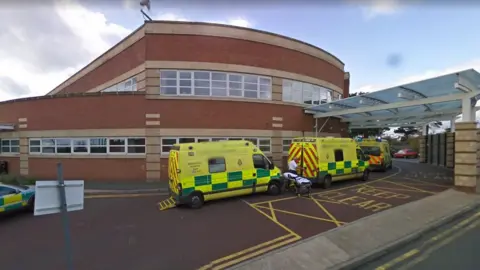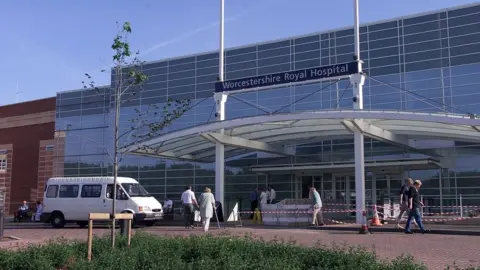Worcestershire Royal Hospital's ambulance wait 'catastrophe'
 Google Maps
Google MapsA hospital's patients face "significant risk of harm on a daily basis", ambulance service bosses have warned.
In private letters to the trust running Worcestershire Royal Hospital, they say it is down to delays getting people off ambulances and into the site.
In the correspondence - obtained by the BBC through a Freedom of Information request - the hospital is also said to risk a "catastrophic situation".
The trust said the experience of some patients was not what it wanted.
Mark Docherty, director of clinical commissioning for West Midlands Ambulance Service, wrote twice in February to Worcestershire Acute Hospital Trust chief executive Michelle McKay.
 PA
PAHe stated that during the first 16 days of the month, 215 ambulances had spent more than an hour outside the hospital.
And he said on 16 February, 10 ambulances waited more than three hours to take patients inside.
"I believe that Worcestershire Royal Hospital is now at a level of concern that requires immediate and radical action if we are to avoid a catastrophic situation," he wrote.
'Field hospital'
He also said the situation had deteriorated over three years and was prepared to put up tents as a field hospital to ensure safety.
A similar measure had been floated during the 16 February incident, but was not deployed.
According to national guidelines, Worcestershire Acute Hospitals NHS Trust is expected to deal with 95% of patients who attend A and E within four hours, but the BBC understands on 16 February it dealt with 47% in four hours.
The trust said there had been a meeting between the parties.
Increases in patients coming through emergency departments, it said, and a higher than expected number of "seriously ill patients arriving by ambulance every day" meant "periods of considerable pressure".
A statement said: "We have not been able to accept patient handovers from ambulance colleagues as promptly as we would have wanted.
"We also recognise that the experience of patients in some of these areas was not what we would want it to be."
